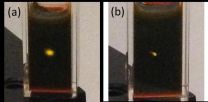Omega-3 fatty acids may help improve treatment and quality of life in cancer patients
2015-07-28
(Press-News.org) Adding omega-3 fatty acids to anti-tumor medications may improve treatment response and quality of life for cancer patients according to a new study by researchers at the University Hospitals of Leicester in the United Kingdom.
The study, published today in the OnlineFirst version of the Journal of Parenteral and Enteral Nutrition (JPEN), the research journal of the American Society for Parenteral and Enteral Nutrition (A.S.P.E.N.), examined 50 patients with advanced pancreatic cancer.
Patients were given 1,000 mg of gemcitabine weekly followed by up to 100 g of omega-3 rich lipid emulsion for three weeks followed by a rest week. This was continued for up to six cycles, progression, unacceptable toxicity, patient request, or death.
The study found evidence of activity in response and disease stabilization rates, reduction in liver metastasis volume, and improved quality of life scores in this group of patients.
While this is the first study to use omega-3 fatty acids with a chemotherapy agent in a cancer setting, the researchers believe the results are encouraging enough to warrant further investigation in a randomized phase III trial.
INFORMATION:
A publication of the American Society for Parenteral and Enteral Nutrition (A.S.P.E.N.), the Journal of Parenteral and Enteral Nutrition (JPEN) is the premier scientific journal of nutrition and metabolic support. It publishes original, peer-reviewed studies that define the cutting edge of basic and clinical research in the field. It explores the science of optimizing the care of patients receiving enteral or intravenous therapies. All published JPEN articles are available online at http://pen.sagepub.com.
The American Society for Parenteral and Enteral Nutrition (A.S.P.E.N.) is dedicated to improving patient care by advancing the science and practice of nutrition support therapy and metabolism. Founded in 1976, A.S.P.E.N. is an interdisciplinary organization whose members are involved in the provision of clinical nutrition therapies, including parenteral and enteral nutrition. With more than 6,000 members from around the world, A.S.P.E.N. is a community of dietitians, nurses, nurse practitioners, pharmacists, physicians, scientists, students, and other health professionals from every facet of nutrition support clinical practice, research, and education. For more information about A.S.P.E.N., please visit http://www.nutritioncare.org.
ELSE PRESS RELEASES FROM THIS DATE:
2015-07-28
A new study finds that exogenous glucagon-like peptide 2 (GLP-2) treatment may help fight neonatal parenteral nutrition-associated liver disease (PNALD).
The study, published today in the OnlineFirst version of the Journal of Parenteral and Enteral Nutrition (JPEN), the research journal of the American Society for Parenteral and Enteral Nutrition (A.S.P.E.N.), provided neonatal piglets with 17 days of parenteral nutrition therapy and either GLP-2 treatment or saline control. In a previous study, the researchers found that GLP-2 therapy improved bile flow and serum markers ...
2015-07-28
Babies born very premature or severely underweight are at heightened risk of becoming introverted, neurotic, and risk averse as adults, indicates research published online in the Archives of Disease in Childhood (Fetal & Neonatal Edition).
This personality profile may help to explain the higher rates of career and relationship difficulties experienced by this group as adults, suggest the researchers.
Very premature birth at less than 32 weeks and/or very low birthweight of less than 1500 g are known to be linked to a heightened risk of autistic spectrum behaviours, ...
2015-07-28
Depression and personality disorders are the most common diagnoses among Belgian psychiatric patients requesting help to die, on the grounds of unbearable suffering, finds research published in the online journal BMJ Open.
Drugs, given either by mouth or administered intravenously, are used to perform euthanasia in Belgium, where the practice has been legal since 2002.
The researchers wanted to find out if there were any discernible patterns in requests for euthanasia among mentally ill patients in Belgium in a bid to inform recommendations for future research.
So ...
2015-07-28
1. Placebo delivery method affects patient response to "therapy"
Free abstract: http://www.annals.org/article.aspx?doi=10.7326/M15-0623
URLs go live when embargo lifts
A systematic evidence review published in Annals of Internal Medicine finds that the way in which a placebo is delivered makes a difference in how patients respond to "therapy." Having a clinically significant response to the sham treatment could substantially affect outcomes in placebo-controlled trials. The data suggests that some placebos have a stronger effect than others.
Placebo controls, ...
2015-07-28
The University of Colorado Cancer Center and Loxo Oncology, Inc. (Nasdaq:LOXO), a biopharmaceutical company focused on the discovery, development and commercialization of targeted cancer therapies, today announced the publication of a research brief in the online edition of the journal Cancer Discovery, describing the first patient with a tropomyosin receptor kinase (TRK) fusion cancer enrolled in the Phase 1 dose escalation trial of LOXO-101, the only selective TRK inhibitor in clinical development. Additional contributors to the paper include the Knight Cancer Institute ...
2015-07-28
RIVERSIDE, Calif. -- When it comes to installing solar cells, labor cost and the cost of the land to house them constitute the bulk of the expense. The solar cells -- made often of silicon or cadmium telluride -- rarely cost more than 20 percent of the total cost. Solar energy could be made cheaper if less land had to be purchased to accommodate solar panels, best achieved if each solar cell could be coaxed to generate more power.
A huge gain in this direction has now been made by a team of chemists at the University of California, Riverside that has found an ingenious ...
2015-07-27
A Johns Hopkins-led study of outcomes among 1,200 people with implanted defibrillators -- devices intended to prevent sudden cardiac death from abnormal heart rhythms -- shows that within a few years of implantation, one in four experienced improvements in heart function substantial enough to put them over the clinical threshold that qualified them to get a defibrillator in the first place.
A report on the study, published in the Aug. 4 issue of the Journal of the American College of Cardiology, reveals these patients had markedly lower risk of dying and were far less ...
2015-07-27
In a project spearheaded by investigators at UC San Francisco, scientists have devised a new strategy to precisely modify human T cells using the genome-editing system known as CRISPR/Cas9. Because these immune-system cells play important roles in a wide range of diseases, from diabetes to AIDS to cancer, the achievement provides a versatile new tool for research on T cell function, as well as a path toward CRISPR/Cas9-based therapies for many serious health problems.
Using their novel approach, the scientists were able to disable a protein on the T-cell surface called ...
2015-07-27
Use of gene therapy to deliver a protein that suppresses the development of female reproductive organs may improve the survival of patients with ovarian cancer that has recurred after chemotherapy, which happens 70 percent of the time and is invariably fatal. In their report receiving online publication in PNAS Early Edition, a Massachusetts General Hospital (MGH) research team describes how a single injection of a modified version of Mullerian Inhibiting Substance, a protein critical to sexual development, carried on a commonly used viral vector suppressed the growth ...
2015-07-27
As many as 20 percent of people may have a benign cyst or tumor in their pituitary gland. The vast majority of pituitary tumors are noncancerous, but can cause headaches and profound fatigue, and can also disrupt hormone function. Currently, surgeons rely on radiologic images and MRIs to gather information about the size and shape of the tumor, but the resolution of such imaging technologies is limited, and additional surgeries to remove more of the tumor may be needed if a patient's symptoms persist. In a new study published in the Proceedings of the National Academy ...
LAST 30 PRESS RELEASES:
[Press-News.org] Omega-3 fatty acids may help improve treatment and quality of life in cancer patients

